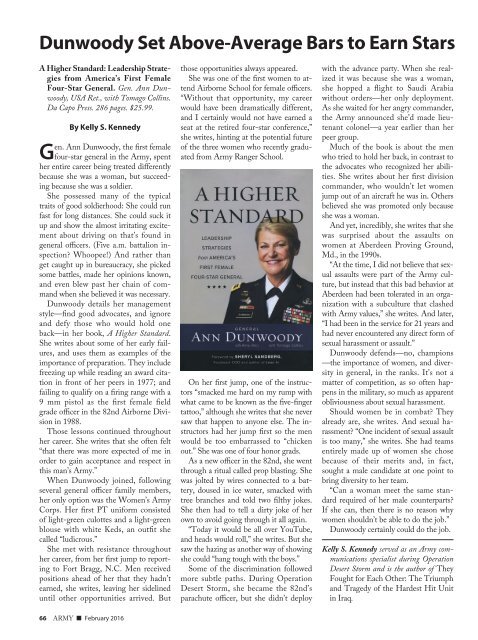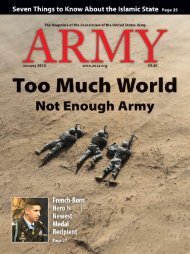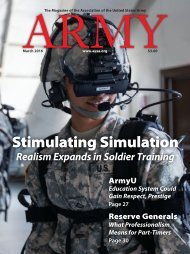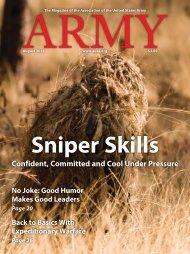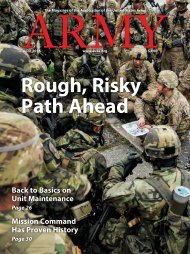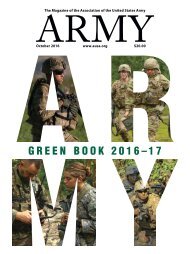Army - Kicking Tires On Jltv
You also want an ePaper? Increase the reach of your titles
YUMPU automatically turns print PDFs into web optimized ePapers that Google loves.
Dunwoody Set Above-Average Bars to Earn Stars<br />
A Higher Standard: Leadership Strategies<br />
from America’s First Female<br />
Four-Star General. Gen. Ann Dunwoody,<br />
USA Ret., with Tomago Collins.<br />
Da Capo Press. 286 pages. $25.99.<br />
By Kelly S. Kennedy<br />
Gen. Ann Dunwoody, the first female<br />
four-star general in the <strong>Army</strong>, spent<br />
her entire career being treated differently<br />
because she was a woman, but succeeding<br />
because she was a soldier.<br />
She possessed many of the typical<br />
traits of good soldierhood: She could run<br />
fast for long distances. She could suck it<br />
up and show the almost irritating excitement<br />
about driving on that’s found in<br />
general officers. (Five a.m. battalion inspection?<br />
Whoopee!) And rather than<br />
get caught up in bureaucracy, she picked<br />
some battles, made her opinions known,<br />
and even blew past her chain of command<br />
when she believed it was necessary.<br />
Dunwoody details her management<br />
style—find good advocates, and ignore<br />
and defy those who would hold one<br />
back—in her book, A Higher Standard.<br />
She writes about some of her early failures,<br />
and uses them as examples of the<br />
importance of preparation. They include<br />
freezing up while reading an award citation<br />
in front of her peers in 1977; and<br />
failing to qualify on a firing range with a<br />
9 mm pistol as the first female field<br />
grade officer in the 82nd Airborne Division<br />
in 1988.<br />
Those lessons continued throughout<br />
her career. She writes that she often felt<br />
“that there was more expected of me in<br />
order to gain acceptance and respect in<br />
this man’s <strong>Army</strong>.”<br />
When Dunwoody joined, following<br />
several general officer family members,<br />
her only option was the Women’s <strong>Army</strong><br />
Corps. Her first PT uniform consisted<br />
of light-green culottes and a light-green<br />
blouse with white Keds, an outfit she<br />
called “ludicrous.”<br />
She met with resistance throughout<br />
her career, from her first jump to reporting<br />
to Fort Bragg, N.C. Men received<br />
positions ahead of her that they hadn’t<br />
earned, she writes, leaving her sidelined<br />
until other opportunities arrived. But<br />
those opportunities always appeared.<br />
She was one of the first women to attend<br />
Airborne School for female officers.<br />
“Without that opportunity, my career<br />
would have been dramatically different,<br />
and I certainly would not have earned a<br />
seat at the retired four-star conference,”<br />
she writes, hinting at the potential future<br />
of the three women who recently graduated<br />
from <strong>Army</strong> Ranger School.<br />
<strong>On</strong> her first jump, one of the instructors<br />
“smacked me hard on my rump with<br />
what came to be known as the five-finger<br />
tattoo,” although she writes that she never<br />
saw that happen to anyone else. The instructors<br />
had her jump first so the men<br />
would be too embarrassed to “chicken<br />
out.” She was one of four honor grads.<br />
As a new officer in the 82nd, she went<br />
through a ritual called prop blasting. She<br />
was jolted by wires connected to a battery,<br />
doused in ice water, smacked with<br />
tree branches and told two filthy jokes.<br />
She then had to tell a dirty joke of her<br />
own to avoid going through it all again.<br />
“Today it would be all over YouTube,<br />
and heads would roll,” she writes. But she<br />
saw the hazing as another way of showing<br />
she could “hang tough with the boys.”<br />
Some of the discrimination followed<br />
more subtle paths. During Operation<br />
Desert Storm, she became the 82nd’s<br />
parachute officer, but she didn’t deploy<br />
with the advance party. When she realized<br />
it was because she was a woman,<br />
she hopped a flight to Saudi Arabia<br />
without orders—her only deployment.<br />
As she waited for her angry commander,<br />
the <strong>Army</strong> announced she’d made lieutenant<br />
colonel—a year earlier than her<br />
peer group.<br />
Much of the book is about the men<br />
who tried to hold her back, in contrast to<br />
the advocates who recognized her abilities.<br />
She writes about her first division<br />
commander, who wouldn’t let women<br />
jump out of an aircraft he was in. Others<br />
believed she was promoted only because<br />
she was a woman.<br />
And yet, incredibly, she writes that she<br />
was surprised about the assaults on<br />
women at Aberdeen Proving Ground,<br />
Md., in the 1990s.<br />
“At the time, I did not believe that sexual<br />
assaults were part of the <strong>Army</strong> culture,<br />
but instead that this bad behavior at<br />
Aberdeen had been tolerated in an organization<br />
with a subculture that clashed<br />
with <strong>Army</strong> values,” she writes. And later,<br />
“I had been in the service for 21 years and<br />
had never encountered any direct form of<br />
sexual harassment or assault.”<br />
Dunwoody defends—no, champions<br />
—the importance of women, and diversity<br />
in general, in the ranks. It’s not a<br />
matter of competition, as so often happens<br />
in the military, so much as apparent<br />
obliviousness about sexual harassment.<br />
Should women be in combat? They<br />
already are, she writes. And sexual harassment?<br />
“<strong>On</strong>e incident of sexual assault<br />
is too many,” she writes. She had teams<br />
entirely made up of women she chose<br />
because of their merits and, in fact,<br />
sought a male candidate at one point to<br />
bring diversity to her team.<br />
“Can a woman meet the same standard<br />
required of her male counterparts?<br />
If she can, then there is no reason why<br />
women shouldn’t be able to do the job.”<br />
Dunwoody certainly could do the job.<br />
Kelly S. Kennedy served as an <strong>Army</strong> communications<br />
specialist during Operation<br />
Desert Storm and is the author of They<br />
Fought for Each Other: The Triumph<br />
and Tragedy of the Hardest Hit Unit<br />
in Iraq.<br />
66 ARMY ■ February 2016


